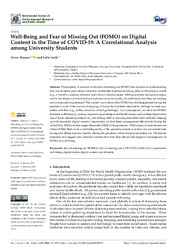Well‐being and fear of missing out (Fomo) on digital content in the time of covid‐19: A correlational analysis among university students
| dc.contributor.author | Şanlı, Ceren Hayran | |
| dc.contributor.author | Anik, L. | |
| dc.date.accessioned | 2022-10-05T13:23:06Z | |
| dc.date.available | 2022-10-05T13:23:06Z | |
| dc.date.issued | 2021-02 | |
| dc.identifier.issn | 1661-7827 | en_US |
| dc.identifier.uri | http://hdl.handle.net/10679/7897 | |
| dc.identifier.uri | https://www.mdpi.com/1660-4601/18/4/1974 | |
| dc.description.abstract | The majority of research on the fear of missing out (FOMO) has focused on understanding how social media posts about attractive unattended experiences taking place in the physical world (e.g., a friend’s vacation) influence individuals’ affective states. With quarantine measures in place, and in the absence of travel and party photos on social media, do individuals feel they are missing out on enjoyable experiences? The current work shows that FOMO has not disappeared during the pandemic, even when socially distancing at home, but has been replaced by feelings towards new online activities (e.g., online concerts, virtual gatherings). As a consequence, we find that FOMO threatens well‐being by causing important psychological and health issues, such as sleep depriva-tion, loss of focus, declined productivity, and finding relief in knowing that others have difficulty keeping up with abundant digital content. Importantly, we find these consequential effects both during the initial (May 2020) and late stages (December 2020) of the pandemic. With excessive Internet use and virtual FOMO likely to be a continuing reality of life, questions remain as to how one can refrain from its negative effects and stay healthy during the pandemic and in the post‐pandemic era. We discuss remedies and suggest new research avenues that may help elevate the negative consequences of FOMO on well‐being. | en_US |
| dc.language.iso | eng | en_US |
| dc.publisher | MDPI | en_US |
| dc.relation.ispartof | International Journal of Environmental Research and Public Health | |
| dc.rights | Attribution-NonCommercial-ShareAlike 4.0 International | * |
| dc.rights | openAccess | |
| dc.rights.uri | https://creativecommons.org/licenses/by/ 4.0/ | * |
| dc.title | Well‐being and fear of missing out (Fomo) on digital content in the time of covid‐19: A correlational analysis among university students | en_US |
| dc.type | Article | en_US |
| dc.description.version | Publisher version | en_US |
| dc.peerreviewed | yes | en_US |
| dc.publicationstatus | Published | en_US |
| dc.contributor.department | Özyeğin University | |
| dc.contributor.authorID | (ORCID 0000-0002-9990-0839 & YÖK ID 275215) Hayran, Ceren | |
| dc.contributor.ozuauthor | Şanlı, Ceren Hayran | |
| dc.identifier.volume | 18 | en_US |
| dc.identifier.issue | 4 | en_US |
| dc.identifier.startpage | 1 | en_US |
| dc.identifier.endpage | 13 | en_US |
| dc.identifier.wos | WOS:000623637600001 | |
| dc.identifier.doi | 10.3390/ijerph18041974 | en_US |
| dc.subject.keywords | COVID‐19 | en_US |
| dc.subject.keywords | Digital content | en_US |
| dc.subject.keywords | Digitalization | en_US |
| dc.subject.keywords | Fear of missing out | en_US |
| dc.subject.keywords | Fear of missing out (FOMO) | en_US |
| dc.subject.keywords | Pandemic | en_US |
| dc.subject.keywords | SARS‐CoV‐2 | en_US |
| dc.subject.keywords | Social media | en_US |
| dc.subject.keywords | Well‐being | en_US |
| dc.identifier.scopus | SCOPUS:2-s2.0-85100844186 | |
| dc.relation.publicationcategory | Article - International Refereed Journal - Institutional Academic Staff |
Files in this item
This item appears in the following Collection(s)
Share this page




